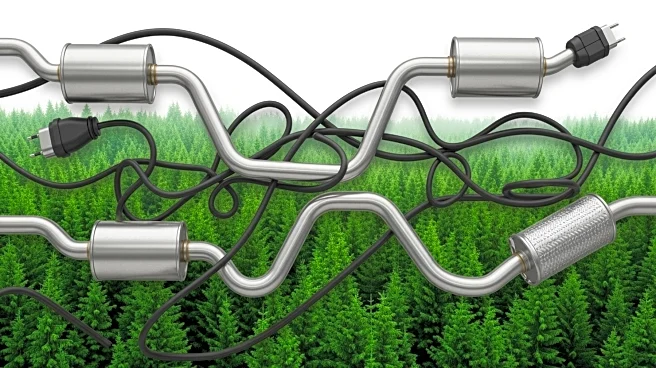What's Happening?
A recent study conducted by Transport & Environment, a Brussels-based non-profit, has revealed that plug-in hybrid electric vehicles (PHEVs) emit significantly more carbon than previously estimated. Contrary
to the assumption that PHEVs emit 75% less carbon than traditional gasoline and diesel vehicles, the study found that they only emit 19% less. This discrepancy is attributed to the fact that PHEVs are not fully electric and continue to rely on internal combustion engines for power, especially during acceleration, high-speed driving, or uphill travel. The study highlights a gap between real-world emissions and official data, with PHEVs emitting 68 grams of CO2 per kilometer in electric mode, far exceeding the EU's estimate of 8 grams. The findings suggest that PHEVs are not as environmentally friendly as consumers might expect, and the EU is considering revising its carbon emissions standards for cars.
Why It's Important?
The study's findings have significant implications for environmental policy and the automotive industry. If PHEVs are not as climate-friendly as believed, it could undermine efforts to reduce carbon emissions and combat climate change. Automakers like Volkswagen, Mercedes-Benz, and BMW have benefited from underestimated emissions, avoiding substantial fines. The EU's potential revision of emissions standards could lead to stricter regulations, impacting the automotive industry's operations and strategies. In the U.S., where interest in electric vehicles is waning due to high prices, the demand for hybrids and PHEVs might increase. However, the environmental benefits of PHEVs are now in question, potentially influencing consumer choices and policy decisions.
What's Next?
The EU is preparing to review its carbon emissions standards for cars next year, which could lead to significant changes in how PHEVs are regulated. The German Association of the Automotive Industry is lobbying against these corrections, aiming to maintain current methodologies and reverse the ban on new combustion engine cars by 2035. If successful, this could result in a substantial increase in carbon emissions by 2050. In the U.S., the American Automobile Association anticipates growing interest in hybrids and PHEVs as electric vehicle demand declines. However, the study's findings may prompt a reevaluation of the environmental impact of PHEVs, influencing future consumer behavior and policy.
Beyond the Headlines
The study raises ethical questions about the transparency of emissions data and the responsibility of automakers in reporting accurate figures. The potential underestimation of PHEV emissions highlights the need for more rigorous testing and validation of environmental claims. This situation also underscores the importance of consumer education regarding the true environmental impact of different vehicle types. Long-term, the findings could drive innovation in automotive technology, pushing manufacturers to develop more efficient and genuinely eco-friendly vehicles.












